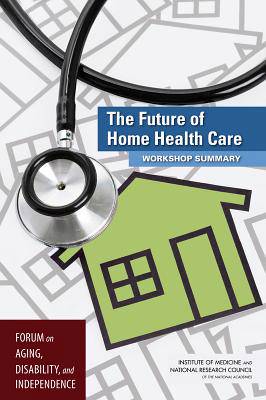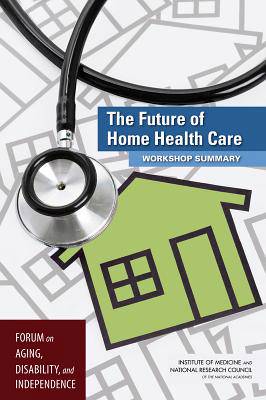
- Afhalen na 1 uur in een winkel met voorraad
- Gratis thuislevering in België vanaf € 30
- Ruim aanbod met 7 miljoen producten
- Afhalen na 1 uur in een winkel met voorraad
- Gratis thuislevering in België vanaf € 30
- Ruim aanbod met 7 miljoen producten
The Future of Home Health Care
Workshop Summary
National Research Council, Institute of Medicine, Division on Behavioral and Social Sciences and Education, Board on Health Sciences Policy, Forum on Aging Disability and IndependenceOmschrijving
Individuals with disabilities, chronic conditions, and functional impairments need a range of services and supports to keep living independently. However, there often is not a strong link between medical care provided in the home and the necessary social services and supports for independent living. Home health agencies and others are rising to the challenges of meeting the needs and demands of these populations to stay at home by exploring alternative models of care and payment approaches, the best use of their workforces, and technologies that can enhance independent living. All of these challenges and opportunities lead to the consideration of how home health care fits into the future health care system overall.
On September 30 and October 1, 2014, the Institute of Medicine and the National Research Council convened a public workshop on the future of home health care. The workshop brought together a spectrum of public and private stakeholders and thought leaders to improve understanding of the current role of Medicare home health care in supporting aging in place and in helping high-risk, chronically ill, and disabled Americans receive health care in their communities. Through presentations and discussion, participants explored the evolving role of Medicare home health care in caring for Americans in the future, including how to integrate Medicare home health care into new models for the delivery of care and the future health care marketplace. The workshop also considered the key policy reforms and investments in workforces, technologies, and research needed to leverage the value of home health care to support older Americans, and research priorities that can help clarify the value of home health care. This summary captures important points raised by the individual speakers and workshop participants.
Specificaties
Betrokkenen
- Auteur(s):
- Uitgeverij:
Inhoud
- Aantal bladzijden:
- 168
- Taal:
- Engels
Eigenschappen
- Productcode (EAN):
- 9780309367530
- Verschijningsdatum:
- 4/09/2015
- Uitvoering:
- Paperback
- Formaat:
- Trade paperback (VS)
- Afmetingen:
- 152 mm x 226 mm
- Gewicht:
- 181 g

Alleen bij Standaard Boekhandel
Beoordelingen
We publiceren alleen reviews die voldoen aan de voorwaarden voor reviews. Bekijk onze voorwaarden voor reviews.









